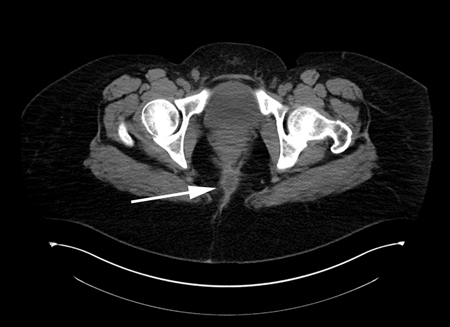Resumo
Definição
História e exame físico
Principais fatores diagnósticos
- fístula anal
- história de doença de Crohn
- sexo masculino
- dor perianal
- endurecimento perianal ou retal
Outros fatores diagnósticos
- inchaço perianal
- febre baixa
- taquicardia
- alteração nos hábitos intestinais
- sangramento retal
- incapacidade de urinar
Fatores de risco
- fístula anal
- Doença de Crohn
- sexo masculino
- fezes duras
- 21 a 40 anos de idade
Investigações diagnósticas
Primeiras investigações a serem solicitadas
- exame clínico
- exame sob anestesia
Investigações a serem consideradas
- contagem leucocitária
- glicose sérica
- eletrólitos séricos
- ultrassonografia anal
- tomografia computadorizada (TC) da pelve
- ressonância nuclear magnética (RNM) da pelve
- exame microscópico e/ou cultura do líquido purulento
Algoritmo de tratamento
todos os pacientes
Colaboradores
Autores
Jan Rakinic, MD, FACS, FASCRS
Professor of Surgery
Chief
Section of Colorectal Surgery
Southern Illinois University School of Medicine
Springfield
IL
Declarações
JR is an author of a reference cited in this topic.
Agradecimentos
Dr Jan Rakinic would like to gratefully acknowledge Dr C. Neal Ellis, a previous contributor to this topic.
Declarações
CNE declares that he has no competing interests.
Revisores
Mark H. Whiteford, MD
Assistant Professor of Surgery
Colon and Rectal Surgery
Gastrointestinal and Minimally Invasive Surgery Division
The Oregon Clinic
Portland
OR
Declarações
MHW declares that he has no competing interests.
Neil Hyman, MD
Chief
Division of General Surgery
Professor of Surgery
Fletcher Allen Healthcare
Burlington
VT
Declarações
NH declares that he has no competing interests.
Steven Brown, MBChB, FRCS, MD, BMedSci
Consultant Surgeon
Department of Colorectal Surgery
Sheffield Teaching Hospitals
Sheffield
UK
Declarações
SB declares that he has no competing interests.
Créditos aos pareceristas
Os tópicos do BMJ Best Practice são constantemente atualizados, seguindo os desenvolvimentos das evidências e das diretrizes. Os pareceristas aqui listados revisaram o conteúdo pelo menos uma vez durante a história do tópico.
Declarações
As afiliações e declarações dos pareceristas referem--se ao momento da revisão.
Referências
Principais artigos
Gaertner WB, Burgess PL, Davids JS, et al. The American Society of Colon and Rectal Surgeons clinical practice guidelines for the management of anorectal abscess, fistula-in-Ano, and rectovaginal fistula. Dis Colon Rectum. 2022 Aug 1;65(8):964-85.Texto completo Resumo
Nomikos IN. Anorectal abscesses: need for accurate anatomical localization of the disease. Clin Anat. 1997;10:239-44. Resumo
Wright WF. Infectious diseases perspective of anorectal abscess and fistula-in-ano disease. Am J Med Sci. 2016 Apr;351(4):427-34. Resumo
Malik AI, Nelson RL, Tou S. Incision and drainage of perianal abscess with or without treatment of anal fistula. Cochrane Database Syst Rev. 2010 Jul 7;(7):CD006827.Texto completo Resumo
Artigos de referência
Uma lista completa das fontes referenciadas neste tópico está disponível para os usuários com acesso total ao BMJ Best Practice.

Diagnósticos diferenciais
- Fissura anal
- Hemorroidas trombosadas
- Abscesso pilonidal
Mais Diagnósticos diferenciaisDiretrizes
- The American Society of Colon and Rectal Surgeons clinical practice guidelines for the management of anorectal abscess, fistula-in-ano, and rectovaginal fistula
- ACR appropriateness criteria: anorectal disease
Mais DiretrizesConectar-se ou assinar para acessar todo o BMJ Best Practice
O uso deste conteúdo está sujeito ao nosso aviso legal